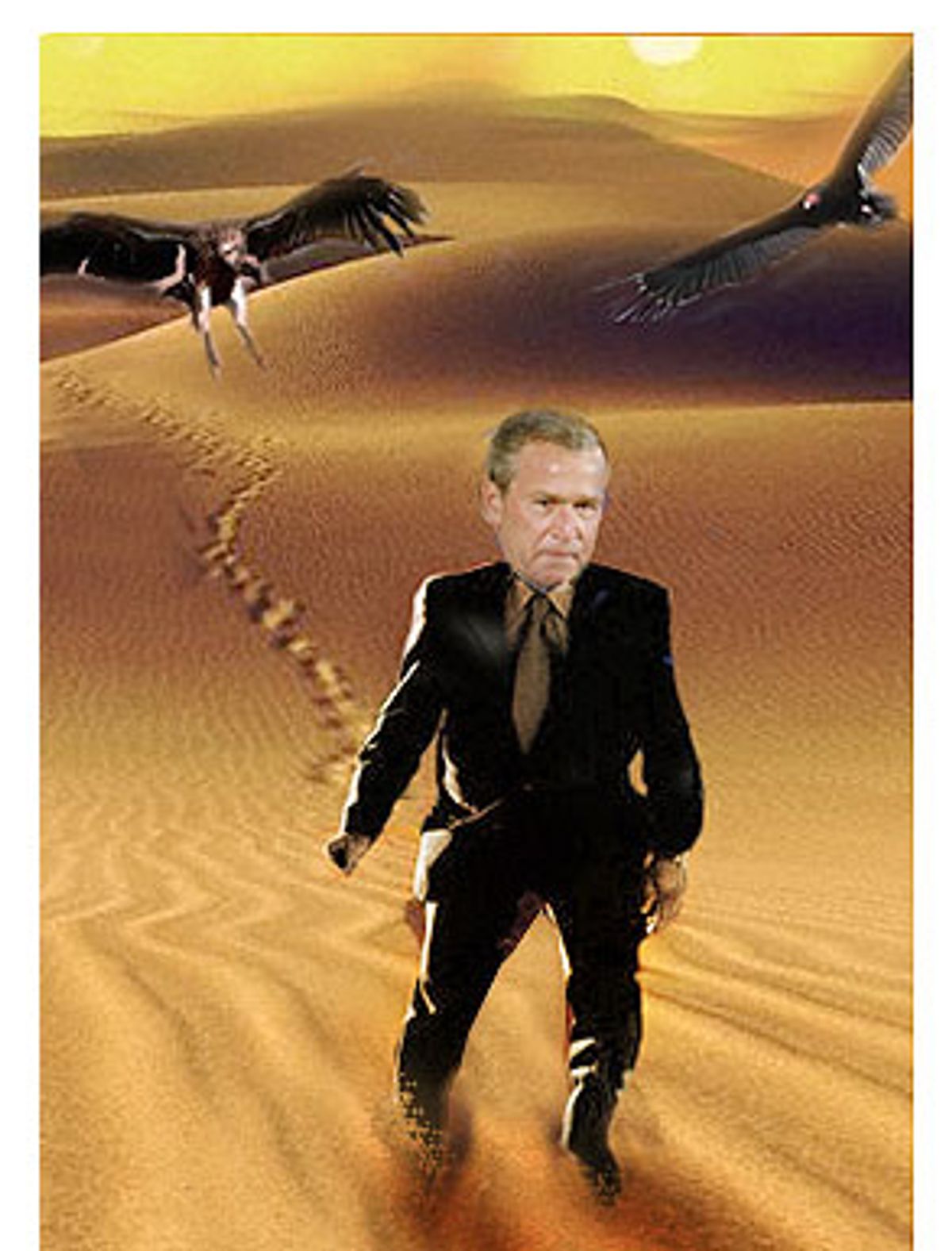Under siege on many fronts, the "wartime presidency" of George W. Bush is facing grave and unexpected jeopardy. Although the traditional advantages of incumbency and money may ultimately protect him from electoral defeat in November, his administration suddenly looks exposed, divided, hapless and flailing. As public confidence wavers, influential segments of Bush's conservative coalition are openly voicing concern. Those who supported the war are furious that the president is turning toward the United Nations in his desperation, while those who opposed the war are convinced that he has committed a mistake of historic proportion.
From inside that big, powerful Republican machine comes the sound of things falling apart.
Signs of trouble are everywhere, from the president's unimpressive performance at his press conference last week to the terrible disarray in Iraq to the disturbing facts unearthed by the 9/11 commission. After spending more than $45 million on advertising in the battleground states since March, Karl Rove must be disappointed by the results: an intractable contest against Democratic challenger John Kerry -- and an electorate that still believes the nation is moving in the wrong direction. Even polls that show Bush with a slight lead over Kerry, like the latest Washington Post-ABC News survey, award the president an anemic approval rating that hovers around 51 percent -- well below that of incumbents who successfully faced reelection in recent years.
As a nonpartisan campaign finance expert told the Los Angeles Times, the Bush-Cheney media expenditures to date equal what previous presidential candidates laid out for an entire campaign cycle. And yet the effort to "define" Kerry hasn't improved Bush's image. Although the Republican treasury is far from exhausted, money alone will not undo the damage inflicted by the administration's lethal incompetence.
Caught in a maelstrom of negative news cycles, the Bush strategists have been unable to elevate him above the growing din of doubt. The national press corps that has indulged and coddled him all along is no longer averting its gaze from embarrassing facts. And with its loss of control over the "message" emanating from Washington, Baghdad and points around the globe, the White House is on the defensive with no immediate relief on the horizon.
Reality's unwelcome intrusion into the president's self-validating worldview began last summer, when the "weapons of mass destruction" that supposedly motivated his war policy stubbornly failed to materialize in Iraq. Unlike other moments during his presidency when Bush largely escaped accountability for blunders and gaffes, that one could neither be ignored nor evaded. The president and his highest-ranking officials had declared with absolute certainty on many, many occasions that the forbidden arsenal existed; they had said that they knew where it would be found; they had staked their reputations on those assertions. If the political impact was not immediate, its corrosive effect on his administration's credibility is unmistakable.
The discovery that the rationale for the war was untrue has opened an ongoing debate about the administration's secret deliberations and concealed intentions. Questions that otherwise might never have been raised demand answers. Deceptions and mistakes are coming under skeptical scrutiny.
From Richard Clarke, Bob Woodward and other critics, we are learning that the public was misled about matters just as grave as the intelligence concerning Saddam Hussein's arsenal and his alleged connections with al-Qaida. The president claims he cannot recall when he ordered his aides to begin planning war on Iraq, but it is clear that the administration was determined to invade long before last spring. The early execution of those plans bypassed budgetary and war-making powers of Congress in a manner that again betrays this administration's contempt for the Constitution.
Under intense pressure from the consequences of their tragic bungling in Iraq, the Bush team is losing its vaunted discipline. Even if the painfully loyal Colin Powell somehow manages to remain in office after quietly disowning the president's foreign policy, the doubts he confided to Bob Woodward will resonate with moderate voters who trust him far more than they trust Bush.
Moreover, Woodward's revelations are sure to encourage other nations to distance themselves from the White House and remove their troops from Iraq. But the worst problem for Bush remains the inarguable proof, reiterated in the media every day, that his logistical, military and diplomatic preparations for war were inadequate or nonexistent -- and that as a consequence, young Americans are losing their lives and limbs without prospect of victory.



Shares